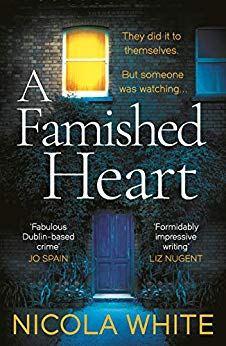 Hello! I hope you are staying safe and finding ways to cope with the exceptionally challenging situation we are all living through. I’m going to keep my promise not to dwell on it here as I can vouch for the psychological benefits of at least trying to think about something else. To my great relief, after two weeks off social media, my ability to read has returned so I’m busy scouting for the Summer Reads selection which will go ahead as usual at the end of May. Any book that makes it will have got there the hard way as I’m currently abandoning two out of three!
Hello! I hope you are staying safe and finding ways to cope with the exceptionally challenging situation we are all living through. I’m going to keep my promise not to dwell on it here as I can vouch for the psychological benefits of at least trying to think about something else. To my great relief, after two weeks off social media, my ability to read has returned so I’m busy scouting for the Summer Reads selection which will go ahead as usual at the end of May. Any book that makes it will have got there the hard way as I’m currently abandoning two out of three!
Meanwhile, the Spring Spotlight guest season continues today – the authors have told me how much they appreciate being able to talk about their books ‘normally’ on the Sofa and I’m sure they’d want me to pass their thanks onto everyone reading this (and hopefully their new releases) and supporting them in any way. My guest this week is Nicola White, author of crime novel A Famished Heart, the first release from new Profile Books imprint Viper and first of a series set in Dublin. As you’ll see from my review below, I connected with several things about this novel, not least the subject Nicola chose for her guest piece: Writing the 1980s. That decade neatly contained my entire teenage and college years and many of yours, I know – enjoy!
I was explaining to someone that the thriller I was writing was set in the 1980s, and she joked ‘Oh, you mean historical fiction.’ I laughed along, but not without an inner wince. We don’t think of what we have lived through as historical time, we fondly imagine it as ‘recent past’. But decades stretch between then and now, so it is undeniably foreign. And yet, our view of the past can actually become clearer as the distance grows.
I remember the eighties vividly, particularly the eighties in Dublin, which is where my trilogy of novels is set. I think of it as a particularly fraught time, a modern Ireland trying to struggle out of the straitjacket of conservatism and theocracy. There was trouble overspilling from the north, heroin streaming into the cities, and recession and mass unemployment triggering another wave of emigration. Magdalene laundries still operated. Infanticide was not uncommon. Homosexual acts and contraception remained illegal. Women’s aspirations for a more progressive country were set back by particularly bruising referendums on introducing divorce (defeated) and abortion (made constitutionally illegal). It is a rich stew of a time for a writer, when enmities were murderous and holy statues were seen to move.
It was also the decade when I myself left Dublin, first to Belfast then to a job in Glasgow. I never intended to emigrate permanently, but that’s how things turned out. Lots of us leave the places we were brought up and make lives elsewhere. But those places and those times still have a hold on us, as Dublin has for me. Writing about the 80s there makes me feel connected to the life I left, and provides the psychological connection that ideas grow from.
What I love about crime fiction, as a reader and a writer, is what a capacious form it is, embracing the personal and the political, ranging across divisions of wealth and opportunity, interrogating power and its abuses. The first book in the trilogy, A Famished Heart, is a closed room mystery about two sisters who appear to have taken their own lives by starvation, but allows me to range widely across ideas of lack – lack of faith, of nourishment and of love in the lives of everyone affected by this initial tragedy.
There are challenges in getting the details of eighties technology and police procedure right, but it was a simpler time in many ways. There were no mobile phones in common use or DNA testing, no CCTV. Records were kept in filing cabinets, mostly. A detective’s task was in many ways more challenging without these tools, more dependent on going out and talking to people, with more potential for him or her to get isolated from his squad. My characters may have the evidence of a particular blood type to go on which cuts down the odds, but not by much. They often have to find a phone box to get in touch with the station, because their radios only work over short distances. In terms of plot, this is an advantage. Technology moves so fast now that a writer in a contemporary setting has the challenge of working around soon-to-be-dated references to 4G or TikTok, for example.
Researching the period details can be absorbing, and I recently spent too many hours watching amateur video on YouTube of people driving around Dublin in the eighties. It was helpful to see the cars and the buses and everyone with their big hair and oversize coats, but you can lose sight of what question you were trying to answer in a world that offers you so much, right to your desktop. Research is essential, but only in the service of something deeper, something that drives the plot.
I like to have a detailed timeline worked out, so that I can read contemporary newspapers from those particular days. It helps to know the weather, what was on television, the debates of the day. Though hardly any of this makes it into the final book, it helps root me in an understanding of time and place. You want your book to have a pulse, you want people to feel a sense of immersion – that this is a living world they’re entering, not just words on a page.
The same goes for characters. I think about the times they grew up in – for Swan that would be the impoverished 1940s, for young Gina Considine the upheaval of the 1960s. Again, these biographical details aren’t dwelt in the novels – crime fiction needs momentum, above all – but these scribbled backstories help me to understand who they are. You have to have a real sense of their desires, because desire drives everything.

Thanks so much to Nicola for the great nostalgia trip (or retro, depending on your DOB) and the insights into her research process.
IN BRIEF: My View of A Famished Heart
Although I rarely read crime fiction, this macabre novel had me hooked. It jumped out from my book post not only for the unusual premise but also because I had one of those trips-that-weren’t-to-be planned to Dublin just before Easter. A Famished Heart excels in the rendition of place and time, prompting reflection on how dramatically everything has changed since the eighties, and it shows that the absence of technology can actually work in favour of a story. It’ll feel very familiar to anyone raised in Irish Catholic culture whether in Ireland or, like me, elsewhere (I was surprised not to feel my usual huge antipathy to the topic). The mystery unravels at a measured pace with an elegance and depth of character which will appeal to a wider readership than fans of highly convoluted crime fiction. This particular case in the careers of Vincent Swan and Gina Considine felt like the literary equivalent of Ashes to Ashes meets Father Ted – I look forward to the next installment.
*POSTSCRIPT*
The programme continues next week with a visit from Anna Vaught, on the photo which inspired her historical novel Saving Lucia, from independent Bluemoose Books. If you missed them, do check out the earlier guest posts in this series from Hannah Persaud on writing an unconventional marriage, Felicia Nay on Hong Kong and Eleni Kyriacou on 1950s Soho.

